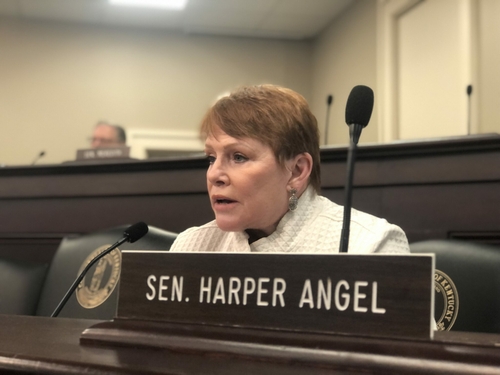Kentucky legislature advances anti-trans bill

This story mentions suicide. If you or someone you know is contemplating suicide, please call or text the National Suicide Prevention Lifeline at 988.
The Trevor Project, which aims to end suicide among LGBTQ+ youth, also has trained counselors available around the clock. Reach them at 1-866-488-7386, via chat at https://www.thetrevorproject.org/get-help/, or by texting START to 678678.
FRANKFORT — State Rep. Jerry Miller retired from the Kentucky legislature in 2022 and “never really wanted to come back to Frankfort — unless it was to go to Buffalo Trace,” he quipped to Senate committee members Tuesday morning.
But he came anyway to testify against House Bill 470, a sweeping anti-transgender measure that later passed the Senate Families and Children Committee 6-3, with one Republican and two Democrats voting against it.
“When I realized (HB470) had a real chance of passing, even though it restricts parents’ rights, it now became personal because my seven-year-old grandchild would be directly affected by it,” said Miller, a Louisville Republican.
HB 470, sponsored by Rep. Jennifer Decker, R-Waddy, proposes banning gender affirming care for minors, including testosterone, estrogen, hysterectomies and vasectomies. There is an exception clause for people who are born intersex.
Under HB 470, health care professionals could lose their licenses, and, when applicable, public funding if they provide “gender transition services” to people under 18 years old.
The bill describes such care as “unethical and unprofessional” and the providers as “unfit to perform the duties and discharge the responsibilities of his or her position or occupation.” People can also sue providers up to 30 years after providing care.
It passed the House in early March. Community advocates, psychologists and physicians previously testified that the bill would harm LBGTQ youth and could result in suicides.
The Trevor Project, which aims to end suicide among LGBTQ+ youth, reported in 2022 that 59% of Kentucky’s transgender and nonbinary kids considered suicide, and 24% tried to take their own lives.
“As a grandfather of two girls, I was thrilled to learn my daughter was pregnant with a boy,” Miller said in his testimony. “I thought of all the things we would do together, like playing ball. That’s just not been my reality.”
Correcting himself on his transgender grandchild’s pronouns throughout the testimony, he said that “regardless of anything, I’m going to love my grandchild and fight for what I think is best” for her.
Behind him, audience members nodded in approval.
“Parental rights” additions to HB 470
The latest version of HB 470 includes new “parental rights” language to say:
- Students in grade five and below will not receive instruction about human sexuality or sexually transmitted diseases. Students in sixth grade and above must have a parent’s consent to receive such instruction.
- Schools may, after public comment, adopt policies related to who can use what bathrooms at school. Schools, that portion of the bill says, “have a duty to protect the dignity, health, welfare, and privacy rights of students in their care.”
Sen. Max Wise, R-Campbellsville, sponsored Senate Bill 150, which would say neither the Kentucky Department of Education or the Kentucky Board of Education could issue guidance about students; pronouns, among other things — language that 470 has now absorbed.
“Parents are demanding and expecting that we have policies in place at the school board level to handle situations of boys and girls in restrooms and locker rooms and in shower rooms,” Wise said in committee Tuesday about his contributions to HB 470.
Parents, he said, “have that expectation of privacy and also an expectation of safety.”
A February Mason-Dixon poll showed 71% of Kentucky registered voters don’t want lawmakers making the decisions about trans youth’s health care. Interviewers polled 625 voters this year for the poll.

Kentucky Lantern photo by Sarah Ladd
Of those polled, 21% — about one in five — Kentuckians did support legislation like HB 470, with 8% undecided, the Fairness Campaign previously reported.
Sen. Karen Berg, D-Louisville, testified against HB 470 as well, but ran out of time before she was able to finish her story about how her child came out as trans. Henry Berg-Bousseau died by suicide in December and advocated for LGBTQ+ rights.
“I don’t like the bill.”
Sens. Stephen Meredith, R-Leitchfield, Denise Harper Angel, D-Louisville, and Robin L. Webb, D-Grayson voted against 470 in committee.
Committee Chair Danny Carroll, R-Benton, voted yes but with this caveat: “I don’t like the bill. I hate the tone of the bill.”
Carroll is working on “some changes” to the language, he said, and: “I think we could have accomplished what we needed to accomplish without going so far.”

Harper Angel, in explaining her no vote, said the legislation is “the largest attempt at government overriding (the) will of our people, our children, our parents that I’ve ever seen in the last 20 years that I’ve been here.”
“It is going to have devastating results and it will not have my name attached to it,” she added.
Sen. Whitney Westerfield, R-Fruit Hill, voted yes in committee but said he would not vote in favor of the bill on the floor without changes.
“I don’t like how far this bill goes,” Westerfield said, adding he doesn’t believe gender affirming surgeries or puberty blockers are appropriate for children. Furthermore, he said: “I don’t believe in transitioning. I don’t think that’s good, I don’t think it’s healthy. I think it goes against what God created.”
But, he said, the language in the bill is too broad. “That liability is huge,” he said. “I think it’s overly hostile to providers.”
Meredith also took issue with harsh punishment for providers who offer care, calling license revoking “a bridge too far.”
“Throughout this legislative session,” said Meredith, “we have promoted bills to support parents’ rights. And I still think that’s where this should lie.”
This story may update.








